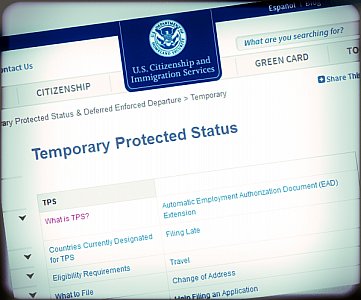
In October 2017 post, I asked whether DACA recipients should be "cultural ambassadors" to their home countries, examining rhetoric that the Department of State (DOS) had used in describing "cultural exchange programs" are authorized under section 101(a)(15)(J) of the INA, popularly known as "J-1" visas. I specifically noted the positive effect that Salvadoran DACA recipients would have on that country's economy and civil society.
Since that post, the secretary of Homeland Security has announced that Temporary Protected Status (TPS) for El Salvador will be terminated "with a delayed effective date of" September 9, 2019, to allow for an orderly departure of the recipients of that status. This decision will affect approximately 195,000 Salvadoran nationals in the United States.
Initial news reports about the secretary's decision described the negative effects that it will have on Salvadorans who are currently in the United States with TPS. For example, CNN reported:
Immigrant rights advocates say it is unfair and cruel to end TPS for Salvadorans who've built lives, paid taxes, contributed to the economy and raised families for nearly two decades in the United States. They also argue that violence and widespread poverty make it unsafe for migrants to return to El Salvador.
On January 15, 2018, however, the Daily Caller presented a different view of that decision. Specifically, an article published on that date indicated that Oscar Cabrera, the president of the Salvadoran central reserve bank had suggested that the return of that country's TPS beneficiaries was "likely to boost El Salvador's economic performance because their labor productivity and educational attainment are much higher than the national average."
In particular, the article quoted Cabrera as stating: "In the case of the returning migrants from the U.S., the beneficial effects that impact the American economy would transfer in the long term to the economy of El Salvador, with those higher-skilled Salvadorans." It continued:
Even with the prospect of reduced remittance flows, Cabrera believes the return of El Salvadorans from the U.S. will be a net positive in the long run. That's because Salvadoran nationals living in the U.S. are now more highly educated than they were a generation ago. In 1980, just 16 percent of Salvadoran migrants in the U.S. had a high school education, but that figure has grown to about 39 percent in recent years, according to Cabrera.
The CIA World Factbook states that in 2016 remittances represented approximately 17.1 percent of El Salvador's gross domestic product, and that those remittances flowed to approximately a third of all the households in that country.
Salvadoran TPS recipients have had the opportunity to live and work in the United States for a minimum of just less than 17 years at this point, and by the date on which that status is set to terminate, they will have been here for a minimum of 18 and one-half years. Presumably during that period of time, they have accumulated not just skills and education, but also rather significant amounts of capital, including bank accounts and real property. The transfer of that capital to El Salvador will likely have a significant effect on that country's economy, similar to the potential economic effects that repatriation of capital accumulated by U.S. companies abroad as result of the recently passed tax bill will have on the American economy.
Not all the benefits that will accrue to El Salvador as a result of the return of those individuals are tangible, however. The Department of State (DOS) "El Salvador 2016 Human Rights Report" states:
The principal human rights problems stemmed from widespread extortion and other crime in poor communities throughout the country. They included widespread corruption; weak rule of law, which contributed to high levels of impunity and government abuse, including unlawful killings by security forces, discrimination, and delay and lack of compliance with court rulings; and violence against women and girls (including by gangs), gender discrimination, and commercial sexual exploitation of women and children. According to a 2016 CID Gallup poll, more than one in five families claim to have been victims of violent crimes.
In improving the economic conditions in that country as a whole, returning Salvadoran TPS recipients will mitigate these problems.
Further, it is doubtful that those returning nationals, having lived for almost two decades in a country with strict adherence to the rule of law, will stand idly aside while such abuses occur. Notably, DOS reports that the government in El Salvador has taken "steps to dismiss and prosecute some officials in the security forces, the executive branch, and the justice system who committed abuses." The Salvadoran government will likely find in its returning TPS nationals strong supporters for those efforts.
